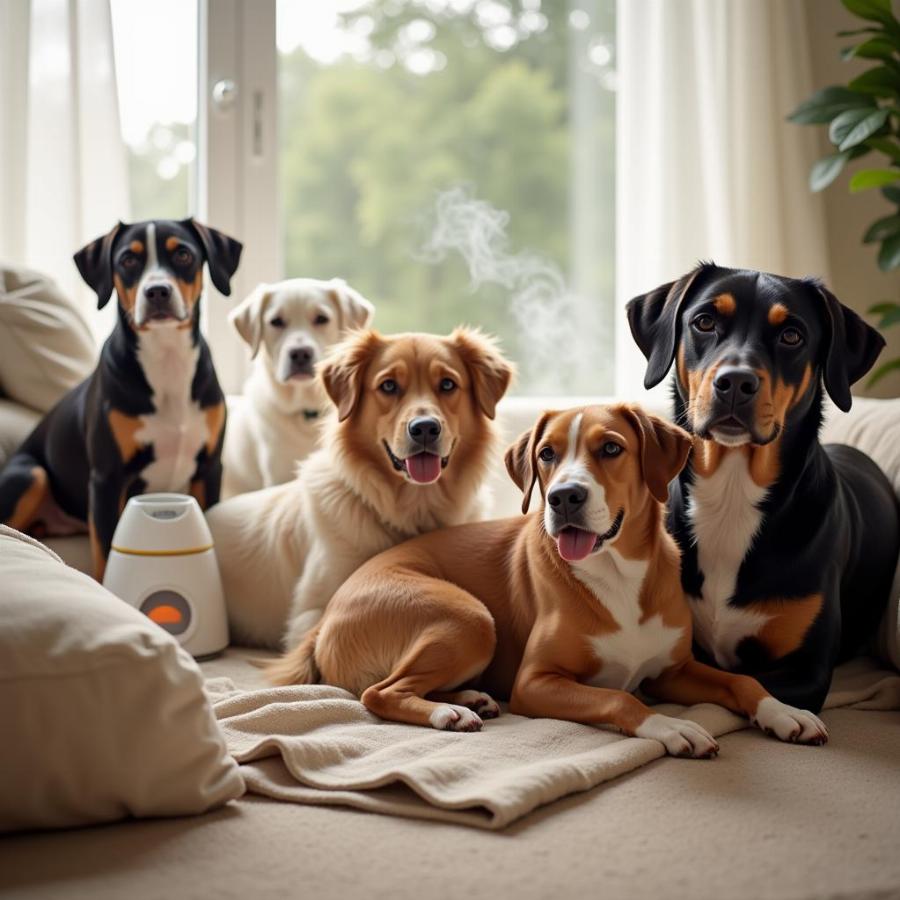Dogs, like humans, can be affected by dry air, especially during winter months or in dry climates. Using a humidifier can be a beneficial way to alleviate some of the discomfort your furry friend might experience due to low humidity. This article will delve into the benefits of using humidifiers for dogs, address potential concerns, and provide a comprehensive guide to selecting and using a humidifier safely and effectively for your beloved canine companion.
Understanding the Benefits of Humidifiers for Dogs
Dry air can lead to a variety of issues for dogs, including dry skin, itchy eyes, respiratory problems, and even a weakened immune system. A humidifier adds moisture to the air, combating these issues and promoting a healthier environment for your dog.  Dogs in a humid environment
Dogs in a humid environment
Dry Skin Relief
Dry air can strip your dog’s skin of its natural moisture, leading to dryness, flaking, and itching. A humidifier can help restore moisture to the air and alleviate these symptoms. This is particularly beneficial for breeds prone to dry skin, such as Bulldogs and French Bulldogs. treating dry skin on dogs
Respiratory Health
Dry air can irritate a dog’s respiratory system, exacerbating conditions like kennel cough or asthma. By adding moisture to the air, a humidifier can help soothe irritated airways and ease breathing. This is especially helpful for brachycephalic breeds, which often experience breathing difficulties.
Enhanced Comfort and Well-being
Beyond addressing specific health concerns, a humidifier can simply make your dog more comfortable. Just as we feel better in a humidified environment during dry weather, our dogs can also benefit from the added moisture in the air. It can help them sleep better, reduce static cling in their fur, and generally improve their overall well-being.
Choosing the Right Humidifier for Your Dog
There are several types of humidifiers available, each with its pros and cons. Choosing the right one for your dog depends on factors like the size of your home, your budget, and your dog’s specific needs.
Types of Humidifiers
-
Ultrasonic Humidifiers: These humidifiers use high-frequency vibrations to create a cool mist. They are generally quiet and energy-efficient.
-
Evaporative Humidifiers: These use a fan to blow air through a moistened wick or filter, creating a cool mist. They are relatively inexpensive but can be noisy.
-
Warm Mist Humidifiers: These humidifiers heat water to create steam, which is then released into the air. They are good for relieving congestion but can be a safety hazard for curious dogs. dry skin for dogs treatment
Safety Considerations
-
Placement: Place the humidifier out of your dog’s reach to prevent them from tipping it over or chewing on the cord.
-
Cleanliness: Regularly clean the humidifier according to the manufacturer’s instructions to prevent the growth of mold and bacteria. what to give dogs for dry skin
-
Water Quality: Use distilled or filtered water to minimize mineral buildup and prevent white dust from accumulating on surfaces.
Maintaining Optimal Humidity Levels
While a humidifier can be beneficial, too much humidity can also create problems, such as mold growth. Aim for a humidity level between 30% and 50%. You can monitor humidity levels with a hygrometer. dog has dry flaky skin
Can a humidifier help my dog with dry, itchy skin?
Yes, a humidifier can add moisture to the air, which can help relieve your dog’s dry, itchy skin.
What type of humidifier is safest for dogs?
Cool mist humidifiers, either ultrasonic or evaporative, are generally considered safer for dogs than warm mist humidifiers.
How often should I clean my dog’s humidifier?
You should clean your dog’s humidifier at least once a week, or more frequently if recommended by the manufacturer. dry skin on dogs home remedies
Conclusion
Using a humidifier can significantly improve your dog’s comfort and well-being, especially in dry climates or during winter. By carefully selecting and maintaining your humidifier, you can help alleviate dry skin, respiratory issues, and other problems associated with dry air. Remember to always prioritize your dog’s safety and consult with your veterinarian if you have any concerns.
FAQ
-
Can I use essential oils in my dog’s humidifier? No, many essential oils are toxic to dogs and should never be used in a humidifier.
-
Is a humidifier necessary for all dogs? No, while beneficial for many dogs, a humidifier is not essential for all dogs. Dogs in humid climates may not require one.
-
How can I tell if my dog is benefiting from a humidifier? Look for improvements in their skin and coat, reduced itching, and easier breathing.
-
Can a humidifier help my dog with allergies? A humidifier can sometimes help alleviate allergy symptoms by moisturizing the nasal passages, but it is not a cure for allergies.
-
What should I do if my dog is afraid of the humidifier? Introduce the humidifier gradually and offer positive reinforcement, such as treats or praise, when your dog is near it.
-
Can I leave the humidifier on all night? Yes, as long as it is safely placed and maintained according to the manufacturer’s instructions.
-
What is the ideal humidity level for dogs? A humidity level between 30% and 50% is generally recommended for dogs.